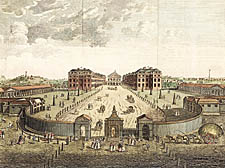|
|
 |
| |
Poverty should have been history by now
CHRISTMAS giving is over, it’s time to count the cost. As usual, shopkeepers panicked the public was not buying. Preliminary figures show Christmas shoppers down but spending at record levels, reflecting one of the saddest changes of recent years. The gap between rich and poor is greater now than ever and growing.
Charities, which concentrate so much of their fund-raising around Christmas time, are tallying income, many hoping to cover the ever-rising costs of their expanding business empires and still have something to pass on to their intended beneficiaries.
A record £18,000,000 raised by viewers on the night of the 2006 Children in Need campaign, demonstrated once again people’s real compassion, a central element of human behaviour.
Whether it’s ‘Make Poverty History’, Band Aid, Oxfam, UNESCO and other development organisations, or any one of the myriad fundraising and distributing charities, people probably donate more money than ever before. Yet despite all the giving, I worry that this wonderful emotion is being killed.
No matter how fast we help poor and disadvantaged children internationally, civil wars and dictatorships, often supported by major corporations, are evicting people and generating homelessness even faster. Latest United Nations High Commission on Refugees figures reveal nearly 25 million refugees around the world, many in makeshift camps.
Far more people are being driven out by wars and bombs, not to mention natural disasters, than we have been able to help. Worldwide, UNHCR reports 13,000 unaccompanied and separated children each year applying for refugee status. Official figures underestimate the scale of the problems.
When I was young my father had a set of Hogarth prints, ‘The Industrious And The Idle Apprentice’, depicting the consequences of prudence and recklessness and highlighting the inequalities within London’s population. They exerted a powerful influence on my sense of right and wrong.
Later, working in my father’s business at Oxford Circus, I watched trade unionists marching for their rights along Oxford Street, the same route Roman soldiers must have tramped almost 2,000 years earlier. Compassion, understanding and empathy with the workers’ plight, claims and aspirations made me become a socialist. I have never abandoned the ideals which moved me then.
Over the past few weeks I went to several events showing what compassion has achieved in the past, one a concert held in the Foundling Museum.
In 1739 Thomas Coram, deeply distressed by the number of children forsaken in London’s streets, established the Foundling Hospital.
It became not only this country’s first public home for abandoned children but also our first public art gallery. The concert and artworks reminded me of the close interrelationship between art, music and charity and how they can collaborate and inspire to transform compassion into action and foment social change.
Hogarth, already a celebrated much-prized artist, donated many paintings to decorate the hospital. The wealthy London public came to view them and the children. The renowned composer Handel performed concerts, donated an organ and wrote music for the Coram Hospital, staging the first performance of his ‘Water Music’ there.
Now, sitting in a chair and pressing a button in the delightful Foundling Museum, you can hear this and other Handel music and view Hogarth’s paintings and many trinkets desperate mothers left with their abandoned children, in the hope that one day they would be reunited. Please visit this outstanding part of our social history.
Although in the UK the scale of that problem has diminished, in Romania alone this year the government estimates 4,500 children will be abandoned because of poverty. Many women there still do not know about contraception.
I also recalled how, as a teenage girl I went to Handel concerts in the old Queen’s Hall (bombed in the war) and walked home alone along Edgware Road, another Roman road, feeling absolutely safe. How London has changed!
The tram from our house on Shoot Up Hill ran to Edgware and Stanmore, then villages deep in the countryside. I was convinced the Stanmore blacksmith was ‘The Harmonious Blacksmith’ of Handel’s music.
Writers, artists, poets, musicians, actors and others have always portrayed society as it is, might become without improvement and could be under ideal conditions and worked for change. 19th century, authors such as Dickens and Mayhew described the vast social chasm between London’s haves and have-nots. Their efforts often spurred politicians to legislate changes aimed at improving society.
20th and 21st century creatives, photographers, cinematographers, documentary-makers, broadcasters, pop-musicians and internet-bloggers, show there is still great social concern and possibilities for pushing politicians towards positive change. However, the power of the corporations usually opposes real change.
Today’s enormous wealth, undreamt of in my time, ought to have made poverty history and ended homelessness. Instead, under New Labour, the gap between rich and poor is greater than at any time since the Victorian era. Executive pay is rising 17 times faster than average pay and do 4,000 Goldman Sachs employees deserve £1 million bonuses and its boss an extra £87 million while ever more people are being excluded from access to housing?
After a century working for equality, despite talk of ‘compassion fatigue’, because all my friends agree with me, I still refuse to believe that compassion is dead, that people are simply predators.
Click here for more from Rose |
 |
|
 |
|







